Hello and welcome!
Sunday, Msgr. Kevin O’Leary and I celebrated our regular weekly television Mass. Of course, this past Sunday was Mother’s Day, and so we offered the Mass for all mothers, living and deceased and in a particular way for birthmothers who were courageous enough to entrust their child to an adoptive family and the mothers of those adoptive families.
Marianne Luthin from our Pro-Life Office was kind enough to come and serve as the lector.
This week, I continued our practice of meeting regularly with groups of seminarians. These are sort of a virtual version of our Vespers, dinner and dialogue gatherings that I would ordinarily be having with them. I met with our transitional deacons on Sunday evening, and I also gathered with our Third Theology men on Thursday.
They have just finished their semester online, and the seminarians are living in different parishes and in small groups. Obviously, this is a very unusual time in which they are living, and these meetings are an opportunity for me to hear firsthand about their experiences in the parishes. Also, for our transitional deacons, this coming weekend would have been their ordination, and we reflected a bit on that in our discussions.
Monday, we had another of our weekly webinars looking at different aspects of the life of the archdiocese during this pandemic. After the great success of our virtual evangelization session last week, we held a follow-up session this week. We once again had a very good turnout, with about 400 participants joining us.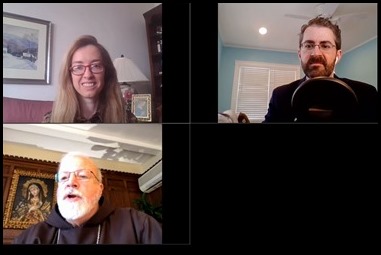
This time, we heard from representatives of Holy Family in Duxbury, St. Margaret’s in Westwood and the Catholic Parishes of Arlington. 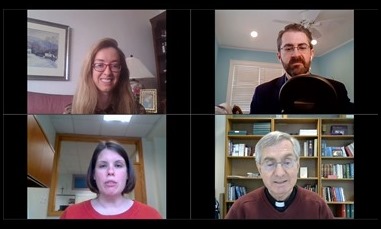
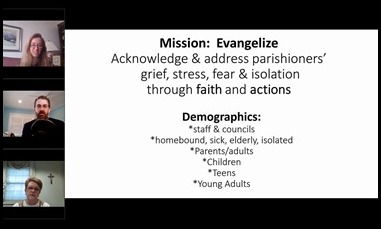
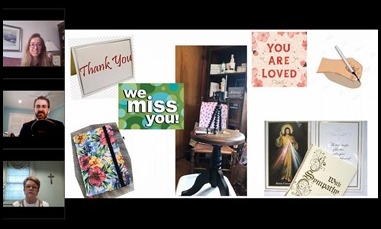

I think these webinars have been a very effective way of keeping people connected and maintaining a sense of community. The danger at a time like this is one of isolation, and I think these types of events that we are holding so frequently have been very helpful for the archdiocese.
Wednesday was the Feast of Our Lady of Fatima and, though the Fatima Shrine was closed this year, it certainly did not stop people from observing the feast. I was talking to friends in Portugal, and one of them sent me a talk that President Reagan gave in Portugal in 1985, in which he spoke about the powerful witness of Fatima to the world. It is a beautiful testimony, and I was very touched by it.
Throughout this time, I have been sending messages of encouragement to different groups ministering in the archdiocese. I began Lent with our seminarians, then our priests and deacons, and this week, on the Feast of Our Lady of Fatima, I issued a message to the women religious in the archdiocese, which I would like to share with you here:
May 13, 2020, Our Lady of Fatima
My dear Sisters,
During this pandemic I wish to offer you a word of encouragement and assurances of prayer as well as to express my great gratitude for your vocation in our Church. As a Church I fear that we do not express our gratitude often enough. Sadly, the attitude frequently can be: “What have you done for me lately?” Despite this, I believe one of the most defining characteristics of American Catholics is our love for the Sisters.
I was lucky to grow up in a world where every parish had three priests and 10 nuns. The Sisters were very much involved in the lives of all the families in the parish. The radical form of love expressed in their consecration and generous service was a huge inspiration to generations of Catholics. It certainly made a difference in my life and in the life of my family, for which we will never be able to repay you.
My entire religious life and priestly ministry has been enriched by the Sisters who have been among my closest collaborators. Recently ordained and working at the Centro Catolico in Washington, I worked with the Carmelite Sisters of Charity and the Dominicans of the Presentation whose commitment to the immigrants and refugees was unwavering. Later, in the Virgin Islands my Chancellor was Sister Louis Marie, a Sister of Charity of Convent Station. Mother Teresa sent me Missionaries of Charity to the Virgin Islands to work with AIDS patients and the poor, they were soon to be joined by the Marist Missionary Sisters who came to help us in the Islands. The first thing I did when I was named Bishop of Fall River was to call Mother Teresa and ask her to send her Sisters to my new diocese that was wracked by the clerical sexual abuse crisis. I wanted our people to see, that despite all the problems and sins in the Church, that there is a holiness, radical love and a spirit of unselfish service in our Church. Mother Teresa responded to my appeal almost immediately.
Here in Boston we have been blessed with so many religious communities of women who selflessly serve Christ and his Church in a whole variety of activities and evangelization: in schools, hospitals, works of mercy, immigration ministry, social justice ministry, communications, as well as in the communities of contemplative life like the Trappistines, Carmelites and Poor Clares. It is no wonder that our Sisters are so beloved.
Religious life has been a constant blessing in the history of the Church. There have been times of extraordinary growth and times when the numbers of consecrated persons in the Church has diminished. What is not diminished is the beauty of this vocation that expresses itself in an incredible variety of charisms.
The pandemic has brought great challenges to the whole world, and our own diocese is one of the hotspots, hit the hardest by the disease. I know that there are many religious sisters who have contracted COVID-19 and are struggling with it, and a few Sisters have passed away as a result of the virus, as have Bishop Allue and some of our brother priests.
Many of our religious women are involved in caring for the elderly in nursing homes or in their own retirement facilities for members of their religious community. One of the things that the virus has done is to show us how vulnerable we all are in the face of this crisis. Our faith in the presence of the Risen Lord is the source of our strength. The religious life is the sign of Jonah, the sign of the resurrection, born of consecrated virginity in the first generations of Christians, as a new form of martyrdom, of witness to the Church’s faith in the resurrection.
I am grateful to all the Sisters for the example of your way of life which proclaims to the world that God must be loved above all else and that God’s love for us is unfailing. Your life of faith and prayer are an unfailing source of strength for our Church. Even as a child I was amazed when we would visit the Poor Clares in my town. Those women without ever leaving the convent were aware of everything happening in our community, because every family in crisis, every person who lost their job, who had a sick relative, the child gone astray or was in a failed marriage, turned to the Sisters for prayers.
It is obvious to all of us in religious life that the older members of our communities who excelled in their ministries and apostolates have evolved into being our very best prayer warriors. They are the Annas and the Simeons in the Temple praying ceaselessly for the liberation of God’s people.
You have always been so close to the people, and I know that in this time of social distancing you are searching for new ways to reach out, especially to shut-ins, personal friends, friends of the community and people in need.
An important part of your ministry has been service to the poor and dedication to the social gospel of the Church. The pandemic has exposed many great injustices in our society when we see how the disease has taken such a toll on the elderly, the black community and immigrants. I am confident that the extraordinary ideals and charisms of religious life can help us to face the challenges of ministering and evangelizing in the different world that we will face after the pandemic finally passes.
During this pandemic I find myself frequently turning to the words of Francis and the Capuchin Constitutions as a source of light and strength. I encourage all of you to find courage in the indomitable spirit of the strong women and men, who founded your communities and pioneered so many extraordinary ministries and institutions, often in times of misfortune, emergencies, wars and natural disasters. May their love and sacrifice be for us an example and an inspiration.
Know that you are all in my thoughts and prayers even as I ask you to keep me in your prayers in the days ahead. With gratitude and affection, I remain always
Fraternally in Christ,
Cardinal Seán
The work of Catholic Charities is now more important than ever. At a time when so many people are losing their gainful employment and are in need of help with food, shelter, living assistance and counseling services, the demands placed on Catholic Charities have grown significantly. While COVID-19 has forced us to isolate, it has never been more important for the Catholic community to come together in support of the growing number of those among us who need our help.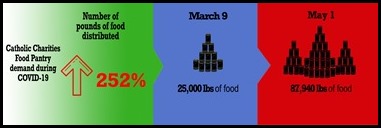
Ordinarily, we would be gathering next week for Catholic Charities’ annual Spring Celebration to raise funds to support their important work. But this year, like many other such events, they have moved their gathering online.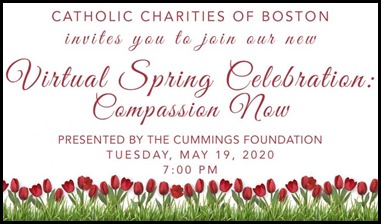 Please use the link below to register for their virtual event on May 19, to experience the inspiring stories of devoted employees, tireless volunteers, grateful clients, and generous donors. We will also hear a special message from Sister Norma Pimentel, Catholic Charities’ 2020 Justice and Compassion honoree.
Please use the link below to register for their virtual event on May 19, to experience the inspiring stories of devoted employees, tireless volunteers, grateful clients, and generous donors. We will also hear a special message from Sister Norma Pimentel, Catholic Charities’ 2020 Justice and Compassion honoree.
https://www.ccab.org/Spring-Celebration-2020
We hope that everyone will be generous and look for ways to participate in the extraordinary and crucial work that is being carried on by Catholic Charities.
Finally, I want to share with you an opinion piece that I authored that was published this week in The Boston Globe. I wanted to offer some reflections on what is happening in our world and our concerns about the disproportionate impact this pandemic is having on certain members of our community.
During the coronavirus pandemic, be the better angel
As our journey through the trying time of COVID-19 extends into May and promises to be with us through the summer and into fall, the dimensions of this crisis are difficult to comprehend. The scientific data are being conscientiously shared with us by women and men of great skill and dedication, but this highly contagious and deadly disease persists.
Beyond science, defining the social reality created by the coronavirus is what many of our leaders and we as citizens struggle with each day. The social reality encompasses our personal existence, our care for our families, our neighbors, and the wider society. The paradox of COVID-19 is that we must confront it together or we will not defeat it, yet the measures we are called to observe – social distancing, staying at home, masking our faces – force us instead to remain separate and apart from each other. What we are experiencing, and likely much of what lies ahead in the near future, is so far from what we’ve known. Governor Charlie Baker and Boston Mayor Marty Walsh have given us wise and reasonable measures to observe. One sure way of working together is to do our part to help mitigate the spread of the disease.
Beyond personal and social disciplines, there are other resources we can rely upon. In modern societies, faith and science are sometimes seen as adversarial. In my view, the common danger posed by COVID-19 invites us to unite these two manifestations of the human spirit. Success lies in maximizing our intellectual and spiritual capacities.
In different ways, faith and science are distinct resources that assist us in interpreting the world we inhabit. Modern science continues to deepen our understanding of our common home. One of the principal characteristics of our society is that the full range of modern science has opened doors for us, from biomedical research to aeronautics, and for others around the globe that had been closed to our ancestors.
Faith complements science; it does not compete with it. It asks questions science does not ask, and in response to questions dealing with meaning and morality, faith speaks to the human spirit and the inquiring intellect. The coronavirus, whatever its origins and its consequences, can leave any of us with the sense that each of us faces its threats alone and unprotected. Science searches for methods of prevention and protection; faith speaks to us about the abiding presence of a God we cannot see or touch, but who surrounds us with care and endows us with courage. As part of the ancient legacy of faith, we were once told that every hair on our head is valued by the creator of the universe.
Faith and science, each in its own way, become sources of human hope. Hope involves the capacity to face reality and not be overwhelmed by it. Science gives us hope based on the conviction that, while the universe is mysterious, its inner laws can be discovered and enhance human life. In just the last century, scientists in this country split the atom and cracked the genetic code, opening frontiers unimagined for ages before us. Faith gives us hope based on the conviction that God works through us, and in our work God is closer to us that we could imagine.
This belief that God works through us brings us back to the social reality of COVID-19. Understanding that social reality begins with a sense of how the coronavirus has impacted our community, our country, and our world. It illustrates in vivid terms that the virus does not recognize borders or boundaries. As we look at the Commonwealth and the country, while all of us are threatened by COVID-19, some are clearly more burdened than others.
There are multiple examples in the media each day that hundreds of citizens are working to alleviate the burdens of those most affected by COVID-19. Health care professionals, including nurses, doctors, and hospital staff are the premier example of those risking their lives to save lives. They are joined by first responders, food suppliers, and pharmacy and transportation professionals. New England poet James Russell Lowell once wrote, “New occasions teach new duties.” We are surrounded by professionals and plain citizens coming forward to fulfill these duties.
Duties to whom? No list would be complete. Any social calculation would have to begin with the statistical data that fills our news each day. But even the best statistics can’t convey the deep human significance of what we are experiencing. Behind every statistic is a life, a face, a family, a narrative of loss and grief. Three examples may exemplify, but will not exhaust, the scope of our reality.
The number of people unemployed exceeds anything we could have imagined, not only now but also, it would seem, for months to come. This consequence of our health crisis cuts across every level of society. From minimum-wage workers to high-income executives, the pace and scope of unemployment is shocking. Work has many dimensions in life; it is not only economic. Work is what gives purpose, direction, and meaning to much of life. Without it, the negative outcomes seamlessly cross from issues of income to identity and a sense of worth. The response to the emerging threat of unemployment requires generous and wise public policy, safety nets, and protection of families from eviction and the provision of health care. It also requires being aware of our neighbors who are experiencing a threat to livelihood and stability.
Unemployment can threaten all sectors of our society. A different focus needs to be directed to specific communities in the Commonwealth and the country. Here, the impact of COVID-19 on the Black and Latino communities requires immediate, specific attention. The social disparities of health have never been more vividly displayed. COVID-19 provides yet another chapter in the nation’s history where race and ethnicity illustrate multiple forms of inequality and require concentrated attention and action. Clearly, we will need an economic recovery that is just and humane.
A different challenge resides in the immigrant communities in our midst. It needs to be said in very clear language that plans to use the COVID crisis to implement policies of expulsion and exclusion of immigrants are unjust, inhumane, and malevolent. Not least among these policies are the conditions in which some detainees in prisons are kept not only at the southern border but in other locations as well.
These three examples do not exhaust those most vulnerable among us. Senior citizens and all those in nursing facilities deserve our prayers; they, and all those who have died and their families, all need to be remembered in our prayers.
We are all at risk. We all need to do whatever must be done to strengthen the bonds of solidarity, civility, and charity in this land; we will do all this only if we do it together. Only if we remember President Lincoln’s exhortation to act from the better angels of our nature. Only if we remember, in religious and secular ways, the words of Jesus: Love one another.
Until next week,
Cardinal Seán
